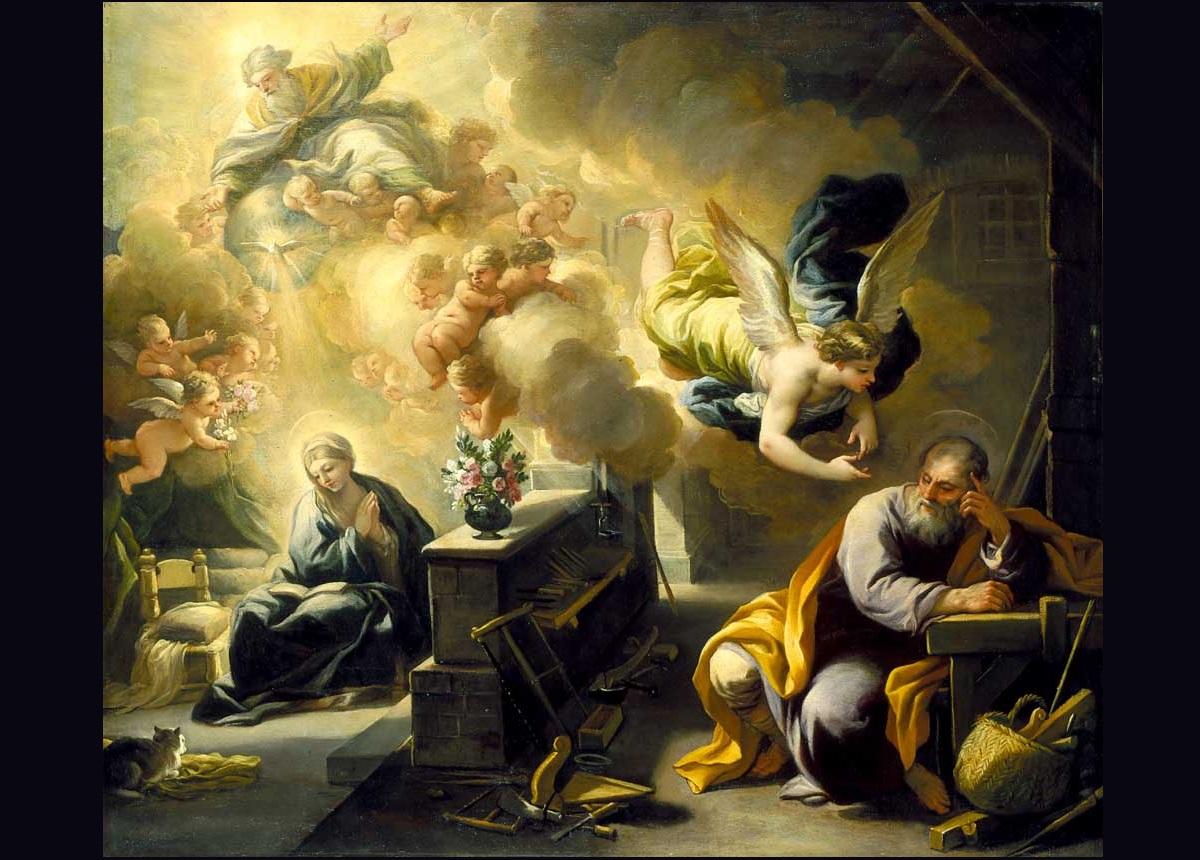By Amber Kinloch
One of the most profound lessons St. Joseph can teach us is the need to cultivate a spirit of silence. Author Federico Suarez expounds beautifully on this subject in his book Joseph of Nazareth. Rather than a biography, Suarez’s work is a series of meditations focused on different themes related to St. Joseph. These meditations are rooted in the few facts provided by Sacred Scripture, facts solidly fleshed out by Suarez’s knowledge of first-century Jewish customs and history. The meditations are further enriched by Suarez’s understanding of human nature and his insistence upon interpreting things in a commonsense way.
Here are four significant points Suarez makes about silence based on the life of Joseph. Most of these are drawn from Chapter 2 (“A Quiet Man”). Credit for the more general points presented here about Joseph’s character also goes to Suarez.
Creating Space for Reflection
Rose Leigh and I are teaching CCD for second graders this year. It is a rewarding endeavor, though not without its challenges. Often, we emphasize to the children the importance of listening. It is difficult, by nature, for them to sit still and pay attention for long. Even when they are quiet, they are not necessarily paying attention. We repeat basic concepts to them over and over, and we’re still not sure whether they’re absorbing the material.
Adults, too, struggle in this realm. When it comes to prayer, most of us would far rather talk than listen or simply sit in silence with God.
St. Joseph is the example par excellence of someone who listens. The Bible doesn’t record a single word he said. Why? As Suarez observes, it’s not because he has nothing to say—he could speak volumes more than any Doctor of the Church. Rather, he keeps silent because he knows his place. His duty was not to speak but simply to be present and contemplate Christ.
We, too, need to practice silence in our daily lives because “One cannot accommodate reflection…with verbosity. A minimum of silence is needed to concentrate on what we have before us, to resolve the questions which daily life frequently poses before our eyes” (pg. 25).
Nor can we contemplate Christ without silence. Contemplation is not about action, but presence. This presence is not a mere lack of doing. It is an active choice to be, to be still and silent like Mary of Bethany resting at Christ’s feet, gazing upon His Sacred Face.
Exercising Fortitude
Suarez also observes that silence is often a manifestation of fortitude, remarking:
“[T]here is great strength in the one who knows how to keep silent, who directs the drive of his will and his attention to the situation in hand, to ‘the one thing necessary’, instead of allowing his energies to be dissipated in a sterile and a more or less futile way over a thousand matters which are not his concern” (pg. 27).
As Suarez points out, many of us waste a great deal of time complaining or anxiously seeking the approval of others. We air our problems to our family, friends, neighbors, coworkers, and strangers. We seek to justify ourselves and our actions, going over in detail why we did this or plan to do that. We nitpick things to pieces all while failing to take due action.
Joseph, by contrast, listens and acts. He does not rush things nor does he waste undue time fretting over issues that must be resolved. If he had required counsel in something, he would have sought it, not from just anyone, but rather the right person for the given situation. Left by himself as in the perplexing case of Mary’s unexplained pregnancy, he keeps silent while he reflects.
Think of the account regarding Jesus’ birth and Joseph’s decision to divorce Mary. Was such a decision arrived at lightly or quickly? Certainly not, for Joseph was “a righteous man, yet unwilling to expose her [Mary] to shame”; therefore, he “decided to divorce her quietly” (Matthew 1:19). On the other hand, when the angel appears to him and tells him to take Mary into his home, he promptly rescinds his decision and does as commanded (Matthew 1:24).
Likewise, when an angel warns him to flee from Herod, Joseph “rose and took the child and his mother by night and departed for Egypt” (Matthew 2:14). He didn’t wait until morning came. He acted at once.
Joseph takes responsibility. He does not dump his problems off on someone else’s shoulders. He bears them courageously and does what must be done.
What about us? How do we face up to difficulties? Do we do so with fortitude? Or do we waste time grumbling? Do we require outside approval—a word of praise, encouragement, or thanks—in everything we do? Are our feathers ruffled if our boss doesn’t give us a pat on the back for a job well done? Are we disappointed if a spouse or friend fails to thank us for something? Do we ask for advice needlessly?
Restraining Evil Talk
Joseph could have caused a great deal of harm by speaking of Mary’s pregnancy to others and letting them know that the child was not his own. Instead, Suarez infers that Joseph let others assume—perhaps with some damage to his own reputation—that the child conceived before he and Mary had come to live together was his.
“With his silence he [Joseph] protects the intimacy of what ought to remain hidden…from unbridled tongues whose one serious occupation seems to be to spread to the corners of the earth ‘news’, rumours, and gossip which are important to nobody and harmful to all that hear” (pg. 29).
Being a just man (i.e., a holy man), Joseph most certainly would have respected his neighbors and shown them love in his speech no matter how they regarded him. One cannot imagine a biting or sarcastic remark springing forth from his lips. Neither would he have gossipped or meddled in others’ business through idle curiosity.
Oftentimes, charity dictates that we should keep quiet. When we do speak (or write), we should choose our words carefully, for:
“Words uttered today live on, perhaps for decades, in the minds of others. No one knows the consequences that may be unleashed because once pronounced—or published—our words are beyond us and outside our control. They can drift from one person to another, day by day, month by month, perhaps for years, awakening profound echoes, plucking sensitive chords in other men that will lead them to work for good or to do evil” (pg. 28).
How much more true are these words today in a world with the Internet and social media!
Avoiding Empty Words
Joseph’s silence, as noted above, is not due to a lack of things to say. “It is a fully occupied silence. It has content.” Why? Because his focus is the divine, not human or earthly things.
This should give us pause. Though we might avoid saying evil things, we can still waste the gift of speech in needlessly prolonged speech or idle, silly, or foolish exchanges. Is that such a big deal? Yes, it is.
Joseph had God at the heart of everything he thought, said, and did. So should we. To squander the gift of speech is to take our focus and that of others off of God. We kill the holy silence necessary for reflection, and steal the praise and attention that is God’s due. No wonder so many find it difficult to cultivate an interior life. How can they, amidst so much noise?
Does this mean we should never banter or joke with others or that we should be silent as monks in a monastery? Of course not. But we should examine how we’re using the gift of speech and make changes as necessary.
Is God the focus—directly or indirectly—of most of our conversations? How about in our social media and news consumption? Do we need to listen, engage in, or follow all these different blogs, news sites, Twitter feeds, and the like? Are these helping us grow closer to God or are we just fixated on being “in the know” like everyone else?
Joseph’s example urges us to purge empty words from our lives and cultivate silence—a silence full of substance and meaning. Let’s learn from him this Advent to make space for silence in our lives so that we might have the joy of contemplating Christ with him.

Amber Kinloch
Amber writes from the bunker of her living room. There she hunkers down with her laptop and a blanket while keeping an eye and ear tuned in to the activity of family life. Music set on loop keeps her energy flowing as she muses on the deeper happenings of ordinary life and what food to restock the fridge with.






I purchased a sleeping Joseph statue today. How appropriate to read about Joseph’s silence a few hours later. The Holy Spirit works in mysterious ways to “educate” us. Thank you for your wise words.
This is beautiful, Pearl, hearing how you sense the Holy Spirit speaking to you through these intertwined incidents. Thank you for sharing this little account of God at work in ordinary life.
This is great! Thank you. Deacon Tom